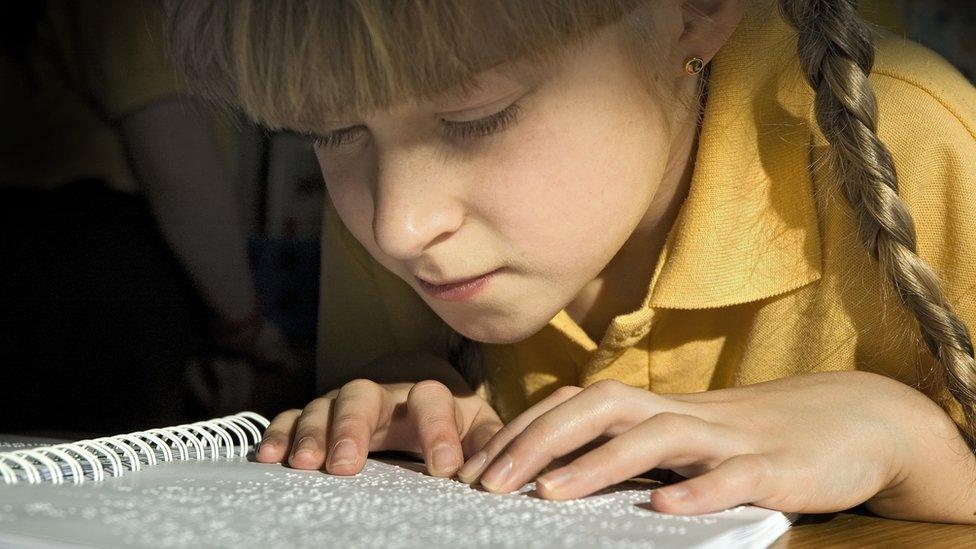Vision impaired pupils need more support, says charity
- Published
- comments

Two in three primary and secondary school teachers who took part in the survey said they lack confidence when it comes to teaching children with a vision impairment
Two in three primary and secondary school teachers lack confidence when it comes to teaching children with a vision impairment, according to a survey carried out on behalf of the charity Guide Dogs.
Nearly 5,000 teachers took part in the poll. 85% said they felt working alongside specialists, including those who provide one-to-one support for vision impaired children and young people, could help them feel more confident when it comes to teaching their blind and partially sighted students.
56% of teachers who took part in the research said they were in favour of future training including information on working with children with a vision impairment.
Just under half of the teachers who took part said they wanted clearer guidance on what adjustments could be put in place in their classrooms to support these pupils.
August's story
It's not just teachers who recognise the need for better support when it comes to educating blind or partially sighted children.
15-year-old August who is vision impaired has seen first hand how adjustments in the classroom can be beneficial, and also how a lack of changes to accommodate her can impact her education.
"I am really lucky because we have a vision impaired (VI) unit at my school which helps me stay in the classroom with my friends, because the work has already been adapted for me," she told Newsround.
Some vision impaired students have experienced difficulties in the classroom
"There are times when there are errors in the communication, and sometimes I have to get my friends to read things to me if things change last minute. While it's really helpful and I appreciate their support, I don't want to be a burden to them and put a strain on our friendship.
"There was a recent time when there were too many people in the group for an exercise, so I left my group of friends to join another group with people I didn't know, and the exercise hadn't been made accessible so I ended up feeling useless in the group.
"I wish that some of the teaching and support staff were better at anticipating my need rather than waiting for me to speak up."
There are 34,000 children and young people growing up with a vision impairment in England according to the charity Guide Dogs.
Around 20% of these children and young people have additional special educational needs (SEND) and/or disabilities.
What is the charity Guide Dogs asking for?
Guide Dogs wants the government to prioritise the role specialist workers play when it comes to the education of vision impaired children.
The charity says children and young people being given the support they require at the right time is important when it comes to their confidence, happiness and independence, and this can also have a positive effect on the people around them.
"Too often, the education system lets these young people down as they struggle to access the support they need," said Blanche Shackleton who works at Guide Dogs.
"What we are hearing from teachers is worrying and we urgently need the Government to address this. Children and young people with a vision impairment tell us they want to grow up enjoying the same opportunities as their classmates: pursuing education and learning, exploring life outside the classroom and realising their ambitions for adulthood."
The charity also wants conditions like vision impairment to have more recognition within the education system and for measures to be put in place to stop young people from falling behind in school before they are able to access the support they need.
13-year-old Eva tells Newsround about the challenges she has faced as a visually impaired student
What has the government said it will do?
The government says it believes vision impaired students should receive a great education just like everyone else.
"All children and young people, including those who have visual impairments, deserve access to high-quality support in education," a spokesperson told Newsround.
It says mainstream schools should do their best to make sure those with additional needs get the support they need to be successful in the classroom and it recently published a paper setting out plans for a new system to improve the outcomes of students with special educational needs (SEND).
The government says it wants to make changes to the current system to improve the education of SEND pupils
"...we are transforming the way the whole system supports school pupils with special educational needs and disabilities through our SEND Review consultation.
"A big part of this is increasing teacher and school staff confidence and training, so all children feel like they have the right support in place for their specific needs."
It also wants lots of people, including parents, children and young people and those who work within the SEND sector to give feedback on the changes it's considering introducing.
- Published22 October 2019
- Published28 September 2020
- Published31 January 2022
